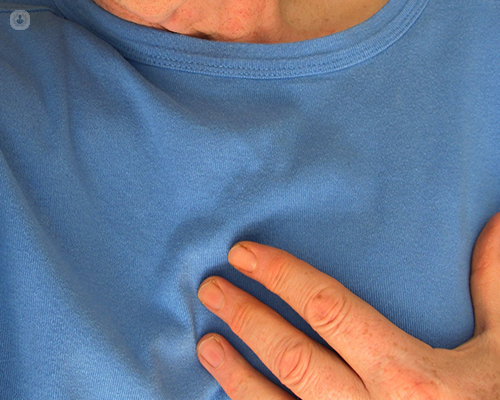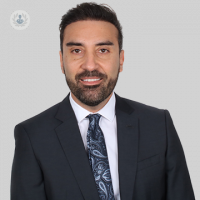What exactly is a heart attack?
Written by:Heart attacks are a well-known condition, and rightly so due their seriousness. However, how much do you know about them in detail?
Leading consultant cardiologist Dr Pierluigi Costanzo answers further questions about heart attacks in-depth, in this informative article.

What is a heart attack?
When somebody refers to ‘heart attack’, often people do entirely understand what exactly this is. In this article I will try to make things clearer.
A heart attack is defined as: when the flow of the blood in one of the major heart arteries suddenly reduces, due to the rupture of a cholesterol-fat build-up of the artery.
The blood flow reduction can either be complete or partial. If the clot occludes the artery completely, the part of the heart muscle supplied by that artery will suffer from something that doctors call ‘ischemia’.
If the blood flow is not promptly restored with drugs or an intervention called angioplasty, that portion of heart muscle will die and scar off. The worst-case scenario, which unfortunately isn’t uncommon, will be that sudden suffering of the heart muscle will cause electrical instability which might cause the heart to essentially to stop working (cardiac arrest). Hence an electrical discharge (defibrillation) would be required to restart the electrical activity of the heart.
That’s why it’s vital to recognise the symptoms of a heart attack and seek immediate medical help with a call to the emergency services right away, without wasting any time at all.
What are these symptoms?
They can vary in quality, however the key thing here is that the symptom is most commonly sudden, out of the blue. Sometimes, it’s triggered by an emotional stress or physical exertion. However, compared to ‘stable angina’, it doesn’t settle within 10-15 minutes or either the nitro-glycerine spray or tablet.
A number of people might have pre-warning signs like stable angina pain a few days or weeks before, which can gradually get worse (this would make the stable angina more worrying, and doctors would call it ‘unstable angina’).
People who have heart attacks usually describe the main symptom being a chest discomfort in the form of pressure, burning sensation, or like somebody ‘sitting on their chest’. It can just involve the chest, or also the left (or occasionally the right) arm, the jaw or the back. Sometimes the pain can travel (‘radiate’) from the chest to these other parts of the body.
However, sometimes, people having a heart attack would experience heartburn, indigestion, nausea, light-headedness or sudden sweat.
That is when a heart attack can go unrecognised and cause the worse damage, as seeking medical help might not be immediate, being the symptoms are not typical.
How would you recognise whether that indigestion, heartburn, nausea, faint or sudden sweat is not a heart attack?
The key adjective here is ‘unusual’. For example, if you never suffer from indigestion and suddenly you feel like you are not digesting a meal (or have heartburn) and maybe you haven’t even eaten anything, well, that could be a sign of a heart attack.
Occasionally, heart attacks might happen after a meal (not that this would cause one) and it presents as an upset stomach.
How would I know it is not a heart attack?
In this case, if the indigestion is persistent (for example, more than 15 minutes) and it isn’t eased by the over-the-counter remedies (anti-acid) or your stomach tablets, you should seek urgent medical help.
We all experience nausea in our life. How would I know that is not a heart attack?
If you have episodes of nausea and already know what would trigger that in your case, chances that being a heart attack are quite small. If the nausea comes out of the blue and it sounds unusual in your case, or even accompanied by sweating (particularly a cold sweat feeling), that is when you seek urgent medical help.
The same advice applies to being faint. If you tend to feel faint when standing up for hours, or standing up too quickly or being a hot environment, chances of that being a heart attack are small. If the faint feeling is out of the ordinary and something you have never experienced before, you should seek medical help.
If you’re concerned about heart attacks, or require expert cardiology treatment, you can arrange a consultation with Dr Costanzo via his Top Doctors profile.


